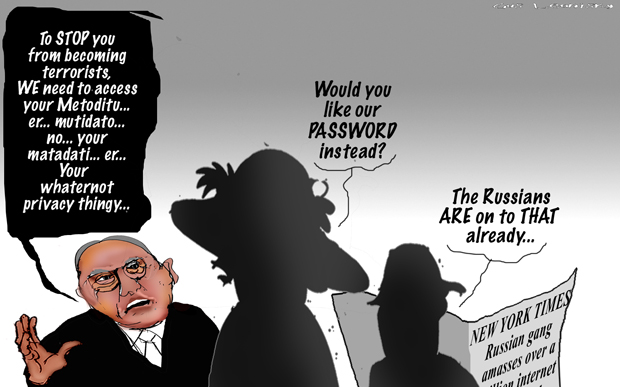Search
Recent comments
- crummy....
12 hours 43 min ago - RC into A....
14 hours 36 min ago - destabilising....
15 hours 40 min ago - lowe blow....
16 hours 12 min ago - names....
16 hours 49 min ago - sad sy....
17 hours 14 min ago - terrible pollies....
17 hours 24 min ago - illegal....
18 hours 36 min ago - sinister....
20 hours 58 min ago - war council.....
1 day 6 hours ago
Democracy Links
Member's Off-site Blogs
hoarder brandis...

- By Gus Leonisky at 8 Aug 2014 - 10:57am
- Gus Leonisky's blog
- Login or register to post comments
the russian connection...
A Russian crime ring has amassed the largest known collection of stolen Internet credentials, including 1.2 billion username and password combinations and more than 500 million email addresses, security researchers say.
read more: http://www.cnbc.com/id/101896806#.
It is time for George to bite the bullet and resign...
While there's some support for the idea that metadata is a useful intelligence tool, more voters take the view that security is being used as a figleaf for the invasion of privacy, write Peter Lewis and Jackie Woods.
Meta what? The Federal Government appears to have implemented a cunning reverse public information strategy around its policy position on the collection of metadata. The more they try and explain it, the less clear it becomes. Envelopes in the internet? Who even knew.
The clear lack of technical understanding shining through from the Government frontbench didn't stop them latching on to international events to pitch a half-baked proposal for the retention of phone and internet records as an anti-terrorist measure.
But this week's Essential Report shows voters are cynical about the bow being drawn, and don't trust the government and telecommunications agencies to safeguard the data they collect (whatever that is).
...
Oh, and one more thing: if we need a Big Brother, does it have to be George Brandis?
http://www.abc.net.au/news/2014-08-12/lewis-and-woods-surplus-of-data-deficit-of-trust/5665184
It is time for George to bite the bullet and resign...
we need a new john stuart mill...
we need a new John Stuart Mill... with philosophical adaptations designed to help us beat our addiction to technology, substances and devices such as credit — imposed upon us by our thieving governments ...
"It is, perhaps, too complimentary to call them Utopians, they ought rather to be called dys-topians, or caco-topians. What is commonly called Utopian is something too good to be practicable; but what they appear to favour is too bad to be practicable."
In Gus' book, they are neo-fascist capitalists with socio-psychopath tendencies... Do they listen to themselves?
Does Joe Hockey REALLY believes that the poor drive less, because the rich have more cars? What a moronic idiot if he REALLY does!
the freedom to punish people because they seek freedom...
I felt for George Brandis this weekend. Only days after delivering a theological tour de force to a high-end Catholic crowd about Christianity and liberty, he woke to discover the Catholic Weekly had banned ads for a speech by the former president of Ireland Mary McAleese.
Such ingratitude. It’s not every day a 21st century attorney general is willing to credit the church with inventing the notion of universal freedom: “Of freedom enjoyed by all, irrespective of status, caste or indeed gender.” Brandis sees this revelation by St Paul as “an obvious precursor to modern liberalism’s injunction to tolerance of divergent views”.
Then the Catholic Weekly slams the door on the former president of Ireland. Why? Because she thinks women should be ordained and Rome should ditch its teachings on homosexuality. As the editor of the Weekly Peter Rosengren explained: “I … endorse all the teachings of the Catholic church, including those on the nature of marriage and the priesthood.”
To outsiders, the Weekly’s decision looks like a not particularly remarkable example of the way churches so often operate. They stand for many fine things, but rarely divergent views.
The timing couldn’t be worse for Brandis. The first law officer of the land was at the University of Notre Dame to lend his weight to an argument being pushed energetically by the conservative thinktanks of the nation: that the churches are owed a great debt for the liberty of the modern world. And the quid pro quo being demanded is fresh respect for what churches call religious liberty.
“So deaf have we become to attacks upon religious liberty,” Brandis told his audience, “so accepting have we been of the open scorn with which their tenets, their liturgy, their customs, their clergy and their congregations have been derided, that the great Dyson Heydon, delivering the Acton Lecture in April this year, was moved to describe anti-Catholicism in modern Australia as ‘the racism of the intellectuals’.”
Brandis doesn’t have the courage to say what he is talking about. He hides in a storm of philosophy. He sticks to general principles. But when the churches talk about religious liberty in peril these days they have only a couple of things on their minds: the freedom of the faiths to define marriage for everyone and their freedom not to have homosexuals on the payroll. What they are defending in the name of liberty are the last ways they have of punishing homosexuals.
Read more: http://www.theguardian.com/world/2014/sep/01/george-brandis-religious-liberty-sexuality-marriage